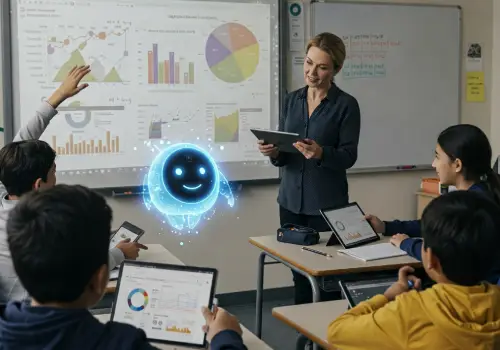Introduction
The rise of Artificial Intelligence (AI) has sparked an ongoing debate: Will AI replace human educators and traditional educational institutions? While AI has revolutionized many industries, its role in education remains a topic of discussion. Can machines truly replace the guidance, empathy, and mentorship that teachers provide ?
Let’s explore the impact of AI on education and why genuine human educators remain fairly irreplaceable.

 Strengths of AI in Learning : Speed, Accuracy, Personalization
Strengths of AI in Learning : Speed, Accuracy, Personalization
AI has introduced several advancements that enhance learning efficiency:
 Personalized Learning: AI-powered platforms analyse student performance and tailor lessons to their individual needs.
Personalized Learning: AI-powered platforms analyse student performance and tailor lessons to their individual needs. Instant Feedback & Accuracy: AI can provide immediate corrections in subjects like mathematics and language learning.
Instant Feedback & Accuracy: AI can provide immediate corrections in subjects like mathematics and language learning. 24/7 Availability: Unlike human teachers, AI-driven chatbots and virtual assistants are accessible anytime, offering help beyond classroom hours.
24/7 Availability: Unlike human teachers, AI-driven chatbots and virtual assistants are accessible anytime, offering help beyond classroom hours. Data-Driven Insights: AI can track student progress, identify weak areas, and suggest targeted improvements.
Data-Driven Insights: AI can track student progress, identify weak areas, and suggest targeted improvements.
 Why Human Guidance is Irreplaceable ?
Why Human Guidance is Irreplaceable ?
Despite AI’s advantages, the role of human educators goes beyond delivering knowledge:
 Emotional Intelligence & Empathy: Teachers understand student's emotions, motivations, and learning challenges, which AI cannot replicate.
Emotional Intelligence & Empathy: Teachers understand student's emotions, motivations, and learning challenges, which AI cannot replicate. Critical thinking & creativity: Educators encourage analytical thinking, problem-solving, and creativity—skills that AI may find difficult to replicate in the near future.
Critical thinking & creativity: Educators encourage analytical thinking, problem-solving, and creativity—skills that AI may find difficult to replicate in the near future. Moral & Ethical Guidance: Teachers shape character, instill values, and guide students in making ethical decisions.
Moral & Ethical Guidance: Teachers shape character, instill values, and guide students in making ethical decisions. Adaptability & Human Interaction: Real-world human to human discussions, classroom debates, and peer interactions cannot be replaced by machines.
Adaptability & Human Interaction: Real-world human to human discussions, classroom debates, and peer interactions cannot be replaced by machines.
 The Future: Hybrid Learning models combining AI and Teachers
The Future: Hybrid Learning models combining AI and Teachers
Rather than replacing educators, AI is transforming teaching methods through hybrid learning models, where technology supports but does not replace teachers. Some examples include:
 Smart Classrooms: AI-powered tools assist teachers in making lessons more interactive and engaging.
Smart Classrooms: AI-powered tools assist teachers in making lessons more interactive and engaging. AI as a Teaching Assistant: Automated grading, lesson planning, and student assessments help reduce teacher's workload.
AI as a Teaching Assistant: Automated grading, lesson planning, and student assessments help reduce teacher's workload. Blended Learning: A mix of online AI-driven learning and face-to-face teaching enhances the learning experience.
Blended Learning: A mix of online AI-driven learning and face-to-face teaching enhances the learning experience.
 The Evolving Role of Teachers as Mentors
The Evolving Role of Teachers as Mentors
As AI takes over repetitive tasks, educators will shift towards mentorship, guiding students in:
 Critical thinking and problem-solving.
Critical thinking and problem-solving. Ethical decision-making and social responsibility.
Ethical decision-making and social responsibility. Interpersonal and leadership skills
Interpersonal and leadership skills Adapting to new technologies
Adapting to new technologies
Conclusion: AI as an Enabler, Not a Replacement
AI will enhance education, not replace teachers or institutions. While AI-driven learning tools provide efficiency and accessibility, human educators remain essential for personal development, critical thinking, and mentorship. The future of education lies in a collaborative approach, where AI acts as a supportive tool, allowing teachers to focus on what truly matters; shaping the next generation of thinkers and leaders.